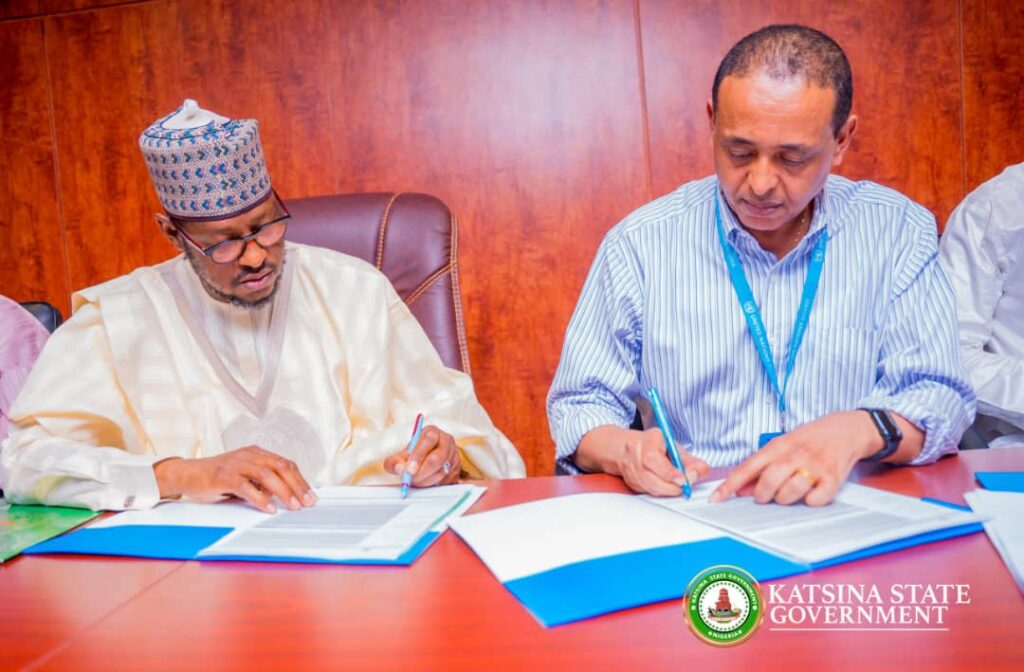From Muawuya Bala Idris, Katsina
The Katsina State Government has signed the UNICEF Multi-Year Work Plan (2025–2027), reinforcing its commitment to improving the lives of children through strengthened education, healthcare, nutrition, and social services.
The work plan, jointly developed by UNICEF and relevant Katsina State ministries and departments, is part of the ongoing Federal Government-UNICEF Country Programme Cooperation (2023–2027).
Speaking during the signing ceremony, Governor Dikko Umar Radda revealed that his administration has invested over ₦120 billion in the education sector, focusing on the construction and rehabilitation of classrooms, equipping science and technical institutions, and recruiting qualified teachers.
“We have successfully upgraded and renovated 158 Primary Healthcare Centres (PHCs), providing them with new medical equipment, solar-powered electricity, water supply, and tricycle ambulances,” the governor said. He added that more PHCs would be rehabilitated this year to ensure each ward has a fully functional facility.
Governor Radda further disclosed that the state had distributed 361 motorcycles to frontline health workers to boost immunization coverage. Additionally, over ₦500 million has been committed in counterpart funding to tackle acute malnutrition in partnership with UNICEF.
“As we sign this work plan today, we do so with a strong sense of purpose,” the governor emphasized. “Katsina State is fully committed to fulfilling our obligations—including counterpart funding—to ensure the successful implementation of this plan.”
He added with conviction: “We will do our part to make this collaboration effective, impactful, and result-oriented. We owe it to our people—especially our children—to ensure that every kobo invested leads to meaningful change.”
Governor Radda also commended UNICEF for its ongoing support in education, health, and other critical sectors in the state.
Earlier, Dr. Serekeberehan Seyoum, Health Manager at UNICEF’s Kano Field Office, praised the governor’s administration for its unwavering commitment to children’s welfare.
“Under Your Excellency’s visionary leadership, this commitment has only grown stronger, with consistent resource allocation to critical programs in health, nutrition, education, and social protection,” Dr. Seyoum stated.
Representing Mr. Rahama Farah, Head of UNICEF’s Kano Office, Dr. Seyoum also commended the state for bold initiatives such as the implementation of the Hadaka Integrated Mobile Outreach and the MCH Track in the health sector, describing Katsina as “a leader in development-driven governance.”
He emphasized that the new work plan “is not just a document—it represents a shared vision for a healthier, safer, and more prosperous future for every child in Katsina.”
Dr. Seyoum urged the state government to consider increasing domestic resource allocation to key sectors, including health, nutrition, education, water and sanitation, child protection, and social welfare. He noted that such investment would help build resilient, self-reliant, and sustainable systems.
He also warned that polio remains a significant threat in the region, calling for the mobilization of resources and heightened awareness to ensure every child is vaccinated.
“Community leaders, religious figures, and local government officials must all be engaged and held accountable to ensure no child is left unvaccinated,” he stressed.
Dr. Seyoum concluded by urging the government to prioritize child-sensitive social protection programs to reduce multiple deprivations among children in both rural and urban areas.


